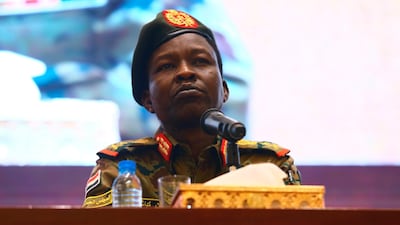Sudan's ruling generals have admitted that security forces committed violations when they broke up a protest camp outside the military headquarters in Khartoum and said the results of an investigation into the deadly operation would be announced on Saturday.
Gen Shams Al Deen Al Kabashi, spokesman for the Transitional Military Council, said several military officers were already in custody over the "painful and outrageous" violations.
"The military council decided to disperse the sit-in and a plan was made ... but we regret that some mistakes happened," Gen Al Kabashi said in a press briefing on Thursday night.
However, the council rejects all calls for an international investigation, he said.
Protest organisers say about 120 people were killed and hundreds more injured in the raid on the sit-in camp on June 3 and subsequent violence by security forces, including attacks on hospitals. The health ministry said 61 were killed that day.
The raid marked an alarming turn in the standoff between the protesters and the military, which removed president Omar Al Bashir from power in April after a months-long popular uprising. Protesters continued their sit-in outside the military headquarters after Mr Al Bashir's removal to demand that power be handed over to civilians.
Weeks of negotiations between the generals and protest leaders on a transitional government reached a stalemate over whether its supreme council should be dominated by the military or by civilians. Protest leaders rejected all further talks after the June 3 raid and began a campaign of civil obedience.
Both sides agreed to resume talks this week after a mediation effort by Ethiopian Prime Minister Abiy Ahmed. However, the military council rejected Mr Abiy's proposal to move the negotiations to Addis Ababa, Gen Al Kabashi said on Thursday.
The spokesman also rejected the protesters' demand that an internet blockade imposed since the crackdown be removed, saying "whatever has to do with social media, we find it dangerous and we will not allow it so long as we see it as a threat to national security".

